人教新目标英语八年级上册unit9单元知识点总结
八年级上人教版unit9知识点
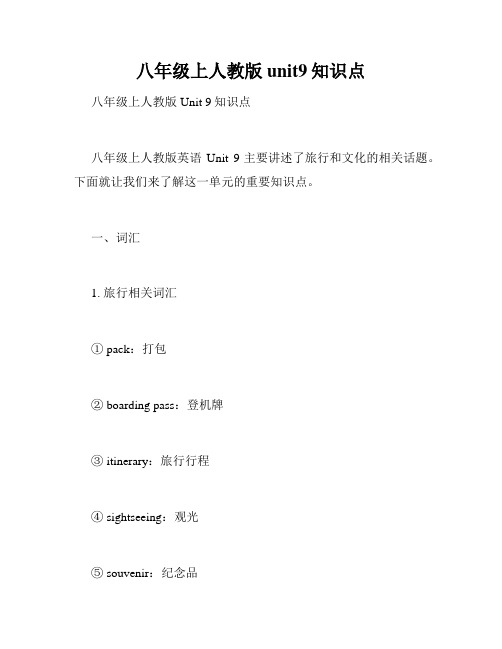
八年级上人教版unit9知识点八年级上人教版Unit 9知识点八年级上人教版英语Unit 9主要讲述了旅行和文化的相关话题。
下面就让我们来了解这一单元的重要知识点。
一、词汇1. 旅行相关词汇① pack:打包② boarding pass:登机牌③ itinerary:旅行行程④ sightseeing:观光⑤ souvenir:纪念品⑥ travel agency:旅行社⑦ tourist attraction:旅游胜地2. 语法1. 一般现在时旅行相关对话使用一般现在时,例如:① What do you usually pack when you travel?② What kind of souvenirs do you usually buy?2. 一般过去时旅行中出现的时间过去时使用一般过去时,包括:① went,took,saw,bought,visited等② What did you do last weekend?3. 现在进行时旅行计划中的动作通常使用现在进行时,例如:① I am packing my bags for the trip.② She is planning to visit Beijing next week.4. 现在完成时表示已经去过或者做过某事情,使用现在完成时,例如:① I have been to the Great Wall.② Have you ever tried the local food when you travel?5. 选择疑问句提出选择性质问题时使用选择疑问句,例如:① Do you prefer traveling alone or with a group?② Would you rather visit a big city or a small town?二、常用句型1. 问路句型Excuse me, how can I get to…?Can you tell me the way to…?Is it far from here to…?2. 寻找帮助句型Excuse me, could you help me?I wonder if you could tell me…Do you know where I can find…?3. 对话句型① What are you going to do this weekend?I am going to…/I am planning to…② Did you go anywhere special on your last vacation? Yes, I went to…/No, I didn't go anywhere special.三、文化知识在旅行中,我们还需要了解一些文化知识,这对于我们更好地了解当地的风俗习惯,与当地人交流有很大帮助。
人教新目标八年级英语上册Unit9知识点归纳汇总

人教新目标八年级英语上册Unit9知识点归纳汇总基本句型1Can you come to my party? 你能来我的派对吗?肯定回答:Yes, I can.Sure.Certainly.Of course. I’d like/love to.Yes, I’d like/love to.Sure, I’d like/love to.否定回答:No, I can’t. I …Sorry, I can’t. I …I am sorry, I can’t.I’m afraid not. I …No/Sorry, I’m not free/available.Sorry, I’d like/love to. But I …(说明:若不能来,则用上述回答来有礼貌地拒绝, 一般情况下需要说明不能接受邀请的原因以表示歉意。
因此省略号表示对不能去的情况的解释说明,需在本单元慢慢积累)小知识:come to one’s party 动词词组,意为“来某人的派对”小知识:I’d = I would总结:can的常见用法(了解即可)一、用于发出邀请。
e.g. Can you come to my birthday party?e.g. Can you go to the movie with me?二、表示能力。
e.g. I can sing and dance.三、表示请求。
e.g. Can you help me?回忆:情态动词have to与must的区别与联系共同点:两者都是情态动词。
区别:1)have to 因受环境或客观因素的影响,“不得不”做某事,其也常常翻译为“必须”。
(别人或环境逼自己)must是主观上严格要求自己,告诉自己“必须”做某事。
(自己逼自己)2)have to有人称,数与时态上的变化。
而must没有人称,数与时态的变化。
说明:一般来说情态动词没有人称与数的变化(have to是个例外),部分情态动词有时态上的变化(can与could)。
八年级英语上册 Unit 9 When was he born教材全梳理 人教新目标版

【英语】八年级上册教材全梳理(Unit 9 When was he born)知识•巧学•升华巧解生词【词析】音析:ear读。
形析:b+ear(耳朵)【例句】 She was born in China.他出生在中国。
【拓展】(1)过去分词:born(2)短语:be born in(on)出生于; be born in one's mind 牢记在心It must be born in your mind that you are a Chinese.你必须牢记在心,你是一个中国人。
【词析】音析:or读形析:re + cord(绳索、束缚)【例句】 Jim has the hiccuppingworld record. 吉姆保持着打嗝的世界记录。
【拓展】(1)同根词:recorder n.录音机(2)短语:keep the record保持记录;break the record打破记录【词析】音析:第一个元音字母a读。
形析:nation(国家)+-al(形容词后缀)【例句】 We refuse to sign any treaty that is against our national interests. 我们拒绝签署任何有损国家利益的协议。
【拓展】(1)同根词:nationalism 民族主义(2)短语:national anthem 国歌【词析】音析:o读。
形析:be(是)+e(来)【例句】 He hopes to bee an engineer when he grows up.他希望长大后当一名工程师。
【拓展】(1)过去式:became(2)短语:bee interested in 对……感兴趣如:Most children bee interestedin puter games.大多数的孩子对电脑游戏感兴趣。
【词析】音析:元音字母a读。
形析:c+all(所有的)【例句】 You can call me Matthew. 你可以叫我马太。
初中英语人教新目标八年级上册 Unit 9 Can you come to my party知识梳理

八年级英语上册Unit 9 单元知识梳理【Useful expressions】prepare for 为……做准备another time 其他时间hang out 闲逛go to the doctor 去看医生the day after tomorrow 后天the day before yesterday 前天look after 照顾,照看turn down 拒绝,调小take a trip 去旅行help out 解决问题look forward to 期待,期盼hear from sb.收到某人来信come to the party参加聚会have the flu患流感too much homework太多的家庭作业study for a test备考not…until… 直到......才......accept an invitation接受邀请at the end of this month在这个月末go to the concert去听音乐会【Target sentences】1.—Can you come to my party on Saturday afternoon?—Sure, I’d love to./ Sorry, I can’t.I have to prepare for an exam.2.—Can you go to the movies tomorrow night?—Sure.That sounds great.—I’m afraid not.I have the flu.3.—Can he go to the party?—No, he can’t.He has to help his parents.4.—Can she go to the baseball game?—No.she’s not available.She must go to the doctor.5.—Can they go to the movies?—No, they’re not free.They might have to meet their friends.6.—What’s today?—It’s Monday the 14th.7.— What day is it today?—It’s Wednesday.8.—What’s the date today?—It’s December 23rd.9.—What’s today?—It’s Wednesday the 23rd.10.I remember we went bike riding together last fall when he visited you.11.Oh, but Sam isn’t leaving until next Wednesday12.Bring Ms.Steen to the party without telling her so that she can be surprised.13.I look forward to hearing from you all.【Language points】1.prepare for an examprepare for 为……做准备prepare sth.“准备某物”,所准备的东西就是后面的宾语。
最全面人教版八年级上册英语第九单元知识点归纳总结
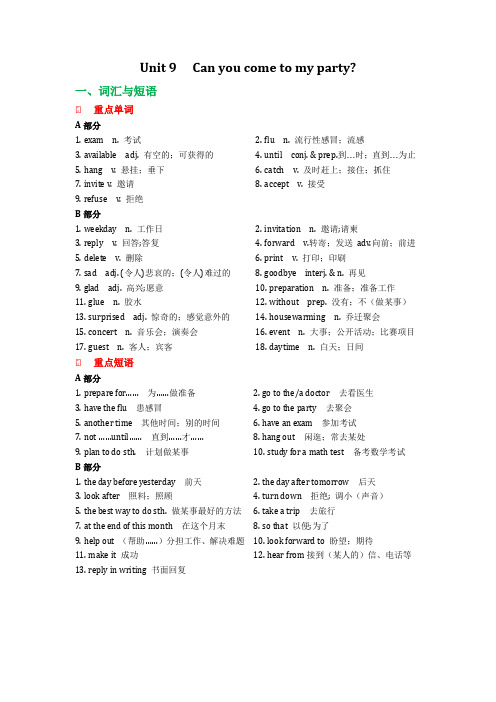
Unit 9 Can you come to my party?一、词汇与短语● 重点单词A部分1.exam n. 考试2.flu n. 流行性感冒;流感3.available adj. 有空的;可获得的4.until conj. & prep.到…时;直到…为止5.hang v. 悬挂;垂下6.catch v. 及时赶上;接住;抓住7.invite v. 邀请8.accept v. 接受9.refuse v. 拒绝B部分1.weekday n. 工作日2.invitation n. 邀请;请柬3.reply v. 回答;答复4.forward v.转寄;发送adv.向前;前进5.delete v. 删除6.print v. 打印;印刷7.sad adj. (令人)悲哀的;(令人)难过的8.goodbye interj. & n. 再见9.glad adj. 高兴;愿意10.preparation n. 准备;准备工作11.glue n. 胶水12.without prep. 没有;不(做某事)13.surprised adj. 惊奇的;感觉意外的14.housewarming n. 乔迁聚会15.concert n. 音乐会;演奏会16.event n. 大事;公开活动;比赛项目17.guest n. 客人;宾客18.daytime n. 白天;日间● 重点短语A部分1.prepare for…… 为……做准备2.go to the/a doctor 去看医生3.have the flu 患感冒4.go to the party 去聚会5.another time 其他时间;别的时间6.have an exam 参加考试7.not ……until…… 直到……才……8.hang out 闲逛;常去某处9.plan to do sth. 计划做某事10.study for a math test 备考数学考试B部分1.the day before yesterday 前天2.the day after tomorrow 后天3.look after 照料;照顾4.turn down 拒绝; 调小(声音)5.the best way to do sth. 做某事最好的方法6.take a trip 去旅行7.at the end of this month 在这个月末8.so that 以便;为了9.help out (帮助……)分担工作、解决难题10.look forward to 盼望;期待11.make it 成功12.hear from接到(某人的)信、电话等13.reply in writing 书面回复● 重点句子A部分1.--Can you come to my party on Saturday? --Sure, I'd love to.--周六你能来参加我的聚会吗?--当然,我想来。
人教版初中英语八上unit9知识点
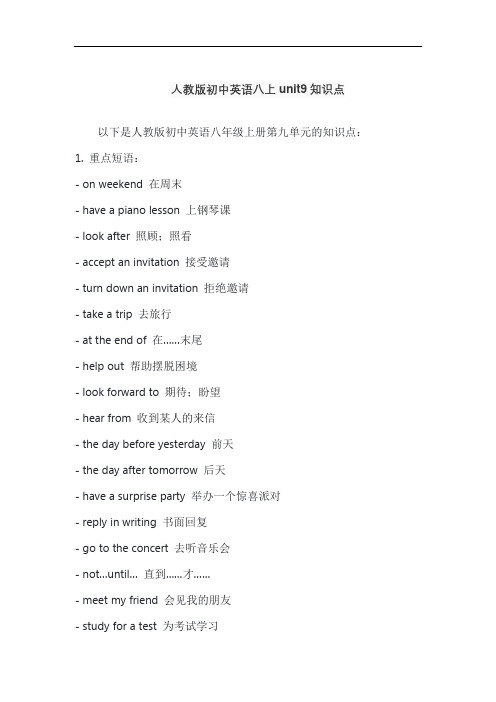
人教版初中英语八上unit9知识点以下是人教版初中英语八年级上册第九单元的知识点:1. 重点短语:- on weekend 在周末- have a piano lesson 上钢琴课- look after 照顾;照看- accept an invitation 接受邀请- turn down an invitation 拒绝邀请- take a trip 去旅行- at the end of 在……末尾- help out 帮助摆脱困境- look forward to 期待;盼望- hear from 收到某人的来信- the day before yesterday 前天- the day after tomorrow 后天- have a surprise party 举办一个惊喜派对- reply in writing 书面回复- go to the concert 去听音乐会- not…until… 直到……才……- meet my friend 会见我的朋友- study for a test 为考试学习2. 重点语法:- 用can 来表达邀请- Can you come to my party on Saturday?- Sure, I'd love to.- Sorry, I can't. I have to prepare for an exam.- 用must 来谈论职责和义务- I must finish my homework first.- I have to look after my sister.- 用might 来表示可能性- He might come to the party.- She might not be able to come.3. 重点句型:- Can you come to my party? 你能来参加我的聚会吗?- I'd love to, but I'm afraid I can't. 我很愿意,但恐怕不能。
人教版新目标版八年级英语上册 Unit 9 Can you come to my party?单元知识归纳
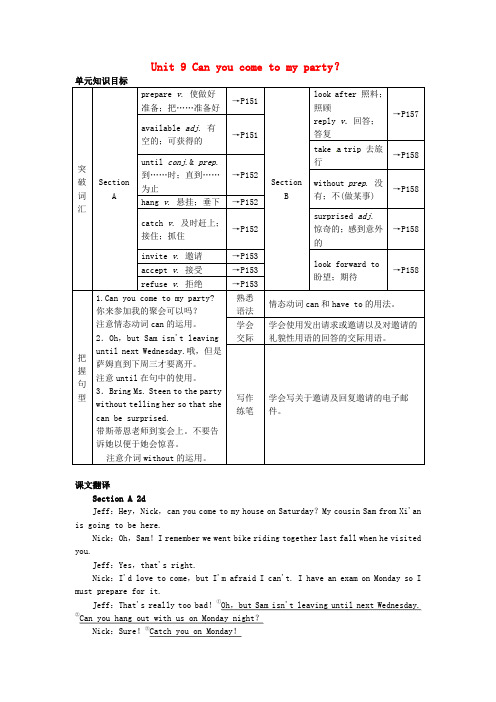
Unit 9 Can you come to my party?突破词汇SectionAprepare v. 使做好准备;把……准备好→P151SectionBlook after 照料;照顾reply v.回答;答复→P157 available adj. 有空的;可获得的→P151take a trip 去旅行→P158 until conj.& prep.到……时;直到……为止→P152without prep. 没有;不(做某事)→P158hang v. 悬挂;垂下→P152catch v. 及时赶上;接住;抓住→P152surprised adj.惊奇的;感到意外的→P158invite v. 邀请→P153look forward to盼望;期待→P158 accept v. 接受→P153refuse v. 拒绝→P153把握句型1.Can you come to my party?你来参加我的聚会可以吗?注意情态动词can的运用。
2.Oh,but Sam isn't leavinguntil next Wednesday.哦,但是萨姆直到下周三才要离开。
注意until在句中的使用。
3.Bring Ms. Steen to the partywithout telling her so that shecan be surprised.带斯蒂恩老师到宴会上。
不要告诉她以便于她会惊喜。
注意介词without的运用。
熟悉语法情态动词can和have to的用法。
学会交际学会使用发出请求或邀请以及对邀请的礼貌性用语的回答的交际用语。
写作练笔学会写关于邀请及回复邀请的电子邮件。
课文翻译Section A 2dJeff:Hey,Nick,can you come to my house on Saturday?My cousin Sam from Xi'an is going to be here.Nick:Oh,Sam!I remember we went bike riding together last fall when he visited you.Jeff:Yes,that's right.Nick:I'd love to come,but I'm afraid I can't. I have an exam on Monday so I must prepare for it.Jeff:That's really too bad!①Oh,but Sam isn't leaving until next Wednesday.②Can you hang out with us on Monday night?Nick:Sure!③Catch you on Monday!杰夫:嘿,尼克,星期六你能来我家吗?我来自西安的表弟萨姆打算到这儿。
人教版八年级上册unit9全部知识点
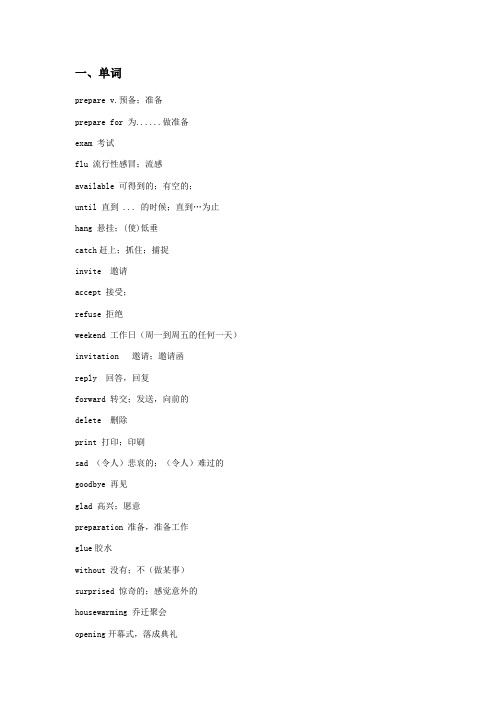
一、单词prepare v.预备;准备prepare for 为......做准备exam 考试flu 流行性感冒;流感available 可得到的;有空的;until 直到 ... 的时候;直到…为止hang 悬挂;(使)低垂catch赶上;抓住;捕捉invite 邀请accept 接受;refuse 拒绝weekend 工作日(周一到周五的任何一天)invitation 邀请;邀请函reply 回答,回复forward 转交;发送,向前的delete 删除print 打印;印刷sad (令人)悲哀的;(令人)难过的goodbye 再见glad 高兴;愿意preparation 准备,准备工作glue胶水without 没有;不(做某事)surprised 惊奇的;感觉意外的housewarming 乔迁聚会opening开幕式,落成典礼concert 音乐会headmaster校长event 大事,公开活动guest 客人calendar 日历,日程表Daytime 白天;日间Ted 特德(男名)May 梅(女名)Vince 文斯(男名)Steen 斯蒂恩(姓)Jake 杰克(男名)Susan 苏珊(女名)重点单词1 invite v. 邀请◆invite sb. to sth.意为“邀请某人加……;邀请某人到……”。
如:I’m going to invite my friends to my party this Sunday.◆invite sb. to do sth. 意为“邀请某人做某事”。
如:The young man invited me to sing just now.【链接】invite的名词形式是invitation。
与invitation相关的短语有:make an invitation 发出邀请accept an invitation 接受邀请turn down / refuse an invitation 拒绝邀请2 refuse v.拒绝不及物动词:I don’t know if Lily will refuse.refuse还可用作及物动词。
人教版八年级上册英语 Unit 9单元知识点总结
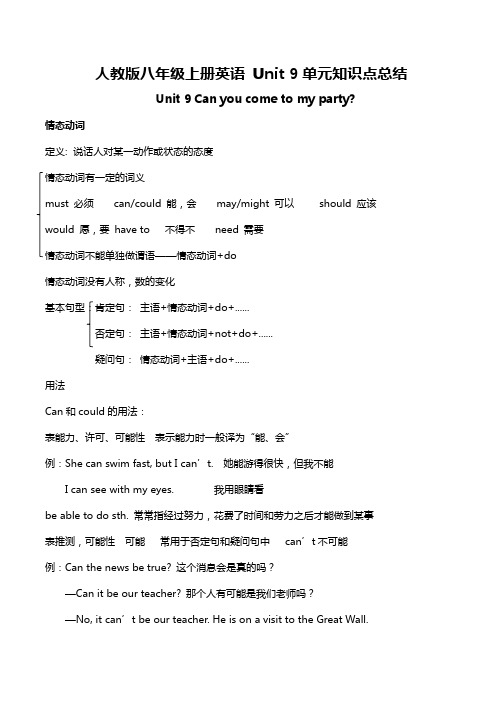
人教版八年级上册英语Unit 9单元知识点总结Unit 9 Can you come to my party?情态动词定义: 说话人对某一动作或状态的态度情态动词有一定的词义must 必须can/could 能,会may/might 可以should 应该would 愿,要have to 不得不need 需要情态动词不能单独做谓语——情态动词+do情态动词没有人称,数的变化基本句型:肯定句:主语+情态动词+do+......否定句:主语+情态动词+not+do+......疑问句:情态动词+主语+do+......用法Can和could的用法:表能力、许可、可能性表示能力时一般译为“能、会”例:She can swim fast, but I can’t. 她能游得很快,但我不能I can see with my eyes. 我用眼睛看be able to do sth. 常常指经过努力,花费了时间和劳力之后才能做到某事表推测,可能性可能常用于否定句和疑问句中can’t不可能例:Can the news be true? 这个消息会是真的吗?—Can it be our teacher? 那个人有可能是我们老师吗?—No, it can’t be our teacher. He is on a visit to the Great Wall.不可能。
咱们老师正在游览长城呢could在疑问句中,表示委婉的语气,此时could 没有过去式的意思例:—Could I use your pen? 我能用一下你的钢笔吗?—Yes, you can.可以(用could问,不能用could答。
)may和might的用法表请求、许可,比can 正式例:May I borrow your bike? 我可以借你的自行车吗?You may go home now. 现在你可以回家了表推测,谈论可能性可能,或许一般用于肯定句中may not 翻译为“可能不”例:It may rain tomorrow. 明天可能会下雨She may be at home. 她可能在家呢may的过去式为might ,表示推测时。
(人教版新目标)八年级英语上册全册各单元知识点期末总复习讲解教学课件

3. feel like “感受到;摸起来”,后跟宾语 从句或名词。 I felt like I was a bird. 我感觉我是一只鸟。 It feels like a stone. 它摸起来像一块石头。
eg.something special; somewhere wonderful. 2.不定代词做主语时,谓语动词用第三人称单数。 eg.Is everybody here? 大家都到齐了吗?
1. get to/reach/arrive 都是“到达“的意思。
get to+sp=reach+sp = arrive at+sp(小)=arrive in+sp(大) 若他们后面要加地点副词here, there, home等,则 不需要加介词。
25、up and down上上下下 26、come up出来 27、enjoy oneself=have fun=have a good time
玩的开心
二、重要句子(语法):
1.Where did you go on vacation? 你到哪里去度假了?
I went to New York City. 我去了纽约城。
三、习惯用法、搭配
1. buy sth. for ab./ buy sb. sth. 为某人买某物 2. taste + adj. 尝起来…… 3. nothing to do but do除了……之外无事可干 4. seem + (to be) + adj 看起来 5. arrive in + 大地方 / arrive at + 小地方 到达某地 6. decide to do sth=make a decision决定做某事 7. try doing sth. 尝试做某事
八年级人教版上册英语unit9知识点
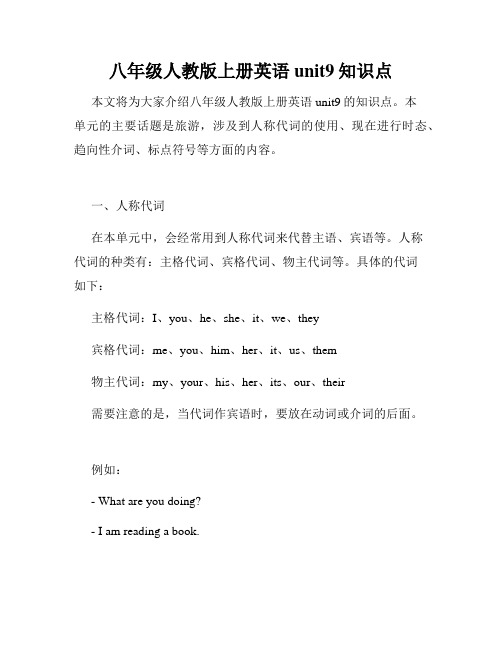
八年级人教版上册英语unit9知识点本文将为大家介绍八年级人教版上册英语unit9的知识点。
本单元的主要话题是旅游,涉及到人称代词的使用、现在进行时态、趋向性介词、标点符号等方面的内容。
一、人称代词在本单元中,会经常用到人称代词来代替主语、宾语等。
人称代词的种类有:主格代词、宾格代词、物主代词等。
具体的代词如下:主格代词:I、you、he、she、it、we、they宾格代词:me、you、him、her、it、us、them物主代词:my、your、his、her、its、our、their需要注意的是,当代词作宾语时,要放在动词或介词的后面。
例如:- What are you doing?- I am reading a book.二、现在进行时态在本单元中,涉及到了现在进行时态(Present Continuous Tense),表示正在进行的动作。
其构成是:主语+be动词+动词-ing。
例如:- She is swimming in the pool.需要注意的是,现在进行时态只适用于正在进行的动作,和习惯性的动作不同。
例如:- He is eating breakfast in the morning. (不正确)- He eats breakfast in the morning. (正确)三、趋向性介词本单元中的一个重要知识点是趋向性介词。
趋向性介词用于描述方向或移动的目的地。
常用的趋向性介词有:to、into、onto、out of、off等。
例如:- She is walking to the park.- The cat is jumping onto the table.四、标点符号在本单元中,标点符号的使用也很重要。
常见的标点符号包括:句号、问号、感叹号、逗号、分号、冒号等。
需要注意的是,这些标点符号的使用要严格遵照语法规则,否则会影响句子的理解。
例如:- What are you doing? (问句)- Look out! (感叹句)- I like swimming, but I don't like diving. (逗号分隔两个并列句)- He has three hobbies: playing basketball, listening to music, and reading. (冒号引出列表)以上是本单元的主要知识点介绍。
八年级英语上册 Unit 9 Can you come to my party短语、语法知识点汇总 (新版)人教新目标版
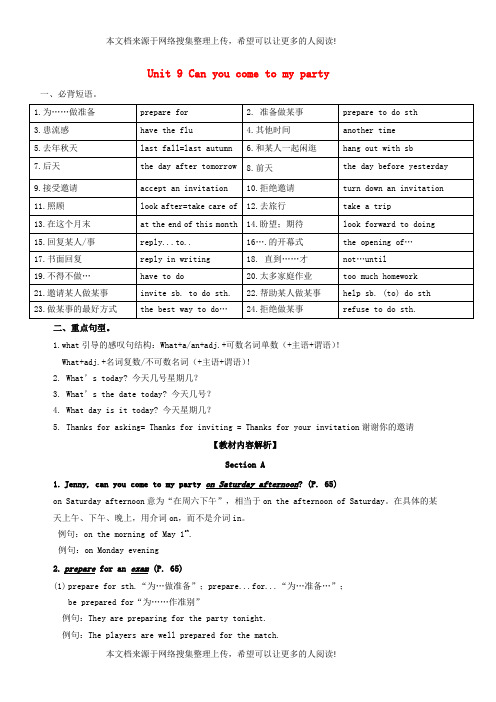
Unit 9 Can you come to my party一、必背短语。
二、重点句型。
1.what引导的感叹句结构:What+a/an+adj.+可数名词单数(+主语+谓语)!What+adj.+名词复数/不可数名词(+主语+谓语)!2. What’s today?今天几号星期几?3. What’s the date today?今天几号?4. What day is it today? 今天星期几?5. Thanks for asking= Thanks for inviting = Thanks for your invitation谢谢你的邀请【教材内容解析】Section A1.Jenny, can you come to my party on Saturday afternoon? (P. 65)on Saturday afternoon意为“在周六下午”,相当于on the afternoon of Saturday。
在具体的某天上午、下午、晚上,用介词on,而不是介词in。
例句:on the morning of May 1st.例句:on Monday evening2.prepare for an exam (P. 65)(1)prepare for sth.“为…做准备”;prepare...for...“为…准备…”;be prepared for“为……作准别”例句:They are preparing for the party tonight.例句:The players are well prepared for the match.(2)exam作名词,表示“考试”,take/have an exam参加考试。
例句:We will take the final exam next week.3.I’m sorry. I’m not available. (P. 66)available作形容词,表示“有空的、可利用的”,常用作表语,相当于free。
人教版新目标八年级英语上册Unit 9讲义及重点总结
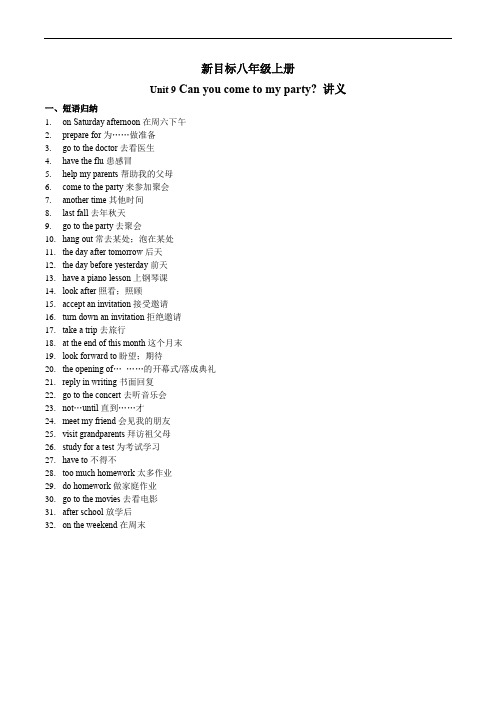
新目标八年级上册Unit 9 Can you come to my party? 讲义一、短语归纳1.on Saturday afternoon在周六下午2.prepare for为……做准备3.go to the doctor去看医生4.have the flu患感冒5.help my parents帮助我的父母e to the party来参加聚会7.another time其他时间st fall去年秋天9.go to the party去聚会10.hang out常去某处;泡在某处11.the day after tomorrow后天12.the day before yesterday前天13.have a piano lesson上钢琴课14.look after照看;照顾15.accept an invitation接受邀请16.turn down an invitation拒绝邀请17.take a trip去旅行18.at the end of this month这个月末19.look forward to盼望;期待20.the opening of………的开幕式/落成典礼21.reply in writing书面回复22.go to the concert去听音乐会23.not…until直到……才24.meet my friend会见我的朋友25.visit grandparents拜访祖父母26.study for a test为考试学习27.have to不得不28.too much homework太多作业29.do homework做家庭作业30.go to the movies去看电影31.after school放学后32.on the weekend在周末二、句型荟萃1. invite sb. to do sth. 邀请某人做某事2. what引导的感叹句结构:What+a/an+adj.+可数名词单数(+主语+谓语)!3. What+adj.+名词复数/不可数名词(+主语+谓语)!4. help sb.(to)do sth.帮助某人做某事5. be sad to do sth.做某事很悲伤6. see sb. do sth. see sb.doing sth.7. the best way to do sth.做某事最好的方式8. have a surprise party for sb.为某人举办一个惊喜派对9. look forward to doing sth.期盼做某事10. reply to sth./sb.答复某事/某人11. What’s today?今天是什么日子?What’s the date today? What day is it today?三、重难点知识讲解1. Can you come to my party on Saturday afternoon?in:用在上午下午晚上,在月份、季节和年之前;on用在星期、日期、节日和特定的某一天前。
八年级英语上册 unit 9 when was he born知识点总结 人教新目标版
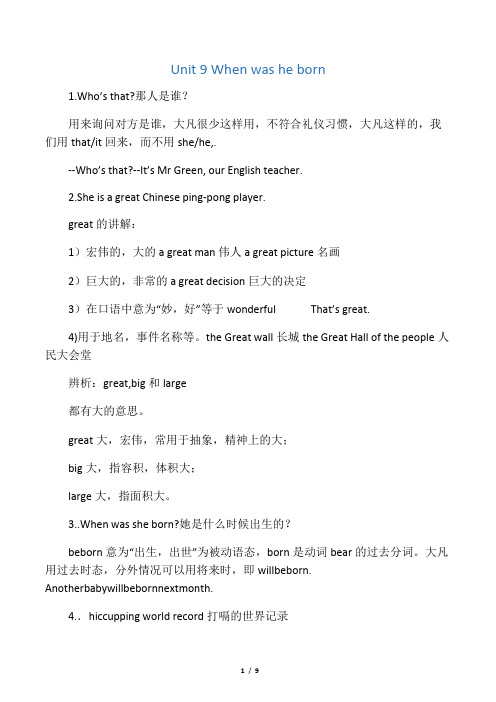
Unit 9 When was he born1.Who’s that?那人是谁?用来询问对方是谁,大凡很少这样用,不符合礼仪习惯,大凡这样的,我们用that/it回来,而不用she/he,.--Who’s that?--It’s Mr Green, our English teacher.2.She is a great Chinese ping-pong player.great的讲解:1)宏伟的,大的a great man伟人a great picture名画2)巨大的,非常的a great decision巨大的决定3)在口语中意为“妙,好”等于wonderful That’s great.4)用于地名,事件名称等。
the Great wall长城the Great Hall of the people人民大会堂辨析:great,big和large都有大的意思。
great大,宏伟,常用于抽象,精神上的大;big大,指容积,体积大;large大,指面积大。
3..When was she born?她是什么时候出生的?beborn意为“出生,出世”为被动语态,born是动词bear的过去分词。
大凡用过去时态,分外情况可以用将来时,即willbeborn. Anotherbabywillbebornnextmonth.4..hiccupping world record打嗝的世界记录1)world records世界记录2)①record n.记录,记载break the record打破记录②record v.记载,记录The programme was recorded.5.When did he start hiccupping?你什么时候开始打嗝的?1)start出发起程We must start early.2)start开始着手start work着手工作辨析:start与begin两者都有“开始”的意思①start动作性较强,留意于开始或着手这一点,带有“突然开始”的意思Let’s start to do it at once.②begin指开始某一行动或进程。
Unit 9知识归纳人教版英语八年级上册

Unit 9 知识归纳Section A1.go to the / a doctor 去看医生go to see a /the doctor2.prepare for an exam / study for an exam 备考prepare for sth. 为…做准备prepare to do sth. 准备做…be/get prepared for sth. = be/get ready for sth. make preparations for sth./ to do为…做准备2.have the/a flu 患流感(状态)have a cold/fever/headacheget/catch the/a flu (动作)4.help my parents 帮助我的父母5.meet my friends 见我的朋友6.be available=be free 有空7.go to the movies 看电影8.another time 其他时间;别的时间9.thanks for asking 谢谢询问thanks for your invitation (thanks for +n)10.on Saturday afternoon 在星期六下午11.go bike riding去骑自行车st fall 去年秋天13.not...until 直到...为止14.hang out with us和我们闲逛;常去某处15.catch you on Monday 周一见catch a bus/ plane/ train赶上公车/ 飞机/ 火车catch up with sb.赶上某人16.fall behind落后17.that sounds great 那听起来很棒18.be planning to do 正计划做19.on Thursday night 在周四晚20.study for a math test 为数学考试学习Section B1.on the calendar 在日历上2.the day after tomorrow 后天3.the day before yesterday 前天4.have a piano lesson 上钢琴课5.look after 照料;照顾6.make a list of 列表7.take a trip to 去旅行8.make/accept/turn down/decline an invitation做/接受/拒绝邀请9.improve my English 提高我的英语10be sad/glad to do 做某事感到悲伤/高兴11.be sad at sth 对某事感到悲伤12.be glad about sth.对某事感到高兴13.see her go 看见她走14.be the best way to do sth. 做某事的最佳方式15.at the end of 在……末尾16.help out with(帮助……)分担工作、解决难题17.party preparations 聚会的准备工作18.by now 到目前为止19.think of 认为;想起20.have a surprise party 举办一场惊喜聚会be surprised to do 惊讶于做某事adj.be surprised at sth 对某事感到惊讶adj.surprise sb.v. = make sb. surprised.让某人感到惊讶make sth. a surprise 让某事成为一个惊喜n.to one’s (great) surprise令某人惊奇地是21.by this Friday 到这周五前22.prepare ... for ... 为……准备……23.without doing sth不做某事24.so that=in order that 以便,为了25.look forward to doing sth. 盼望/ 期待做某事adv.26.forward sth. to sb.转递,转发v.27.hear from sb. = get/ receive a letter from sb.收到某人的来信28.hear sb. do/ doing 听见某人做/正在做29.one of your favorite teachers你最喜欢的老师之一30.invite sb. to ...邀请某人参加……;邀请某人到……invite sb. to do sth. 邀请某人做某事invite sb. to sp 邀请某人去某地get/receive an invitation to sp 收到去某地的邀请31.receive sth. from sb 收到某人的东西32.refuse to do 拒绝做某事33.turn down sb./ sth.拒绝某人/某物turn them down拒绝他们turn around转过来turn over 翻过来turn to 翻到34.on weekdays = from Monday to Friday在平日on/ at weekends= on/at the weekend在周末35.look after sb.well. = take good care of sb.照顾好某人36.look up 仰望,查阅37.reply to sb 回答某人v.the reply to the question 问题的回答n.make/get a reply to 做/得到回答n.reply (in writing) to this invitation 回复邀请38.as a gift 作为礼物39.go to the concert 去听音乐会40.visit my grandparents 拜访我的(外)祖父母Grammar1.---What’s today?---It’s Monday the 14th.---What day is (it) today?---It’s Thursday.---What’s the date today?---It’s May 2nd.2.感叹句What+(a/an)+adj.+n.+(主语+谓语)!What a lovely girl (she is)!How+adj./adv.+(主语+谓语)!How fast the train runs!3.can 能够,会(could)(情态动词无人称和数的变化,其后跟动词原形)1).意思和be able to相同。
- 1、下载文档前请自行甄别文档内容的完整性,平台不提供额外的编辑、内容补充、找答案等附加服务。
- 2、"仅部分预览"的文档,不可在线预览部分如存在完整性等问题,可反馈申请退款(可完整预览的文档不适用该条件!)。
- 3、如文档侵犯您的权益,请联系客服反馈,我们会尽快为您处理(人工客服工作时间:9:00-18:30)。
人教新目标英语八年级上册
Unit9 Can you come to my party? 知识点情态动词
定义: 说话人对某一动作或状态的态度
情态动词有一定的词义
must 必须can/could 能,会may/might 可以should 应该would 愿,要have to 不得不need 需要
情态动词不能单独做谓语——情态动词+do
情态动词没有人称,数的变化
基本句型:肯定句:主语+情态动词+do+......
否定句:主语+情态动词+not+do+......
疑问句:情态动词+主语+do+......
用法
Can和could的用法:
表能力、许可、可能性表示能力时一般译为“能、会”
例:She can swim fast, but I can’t. 她能游得很快,但我不能
I can see with my eyes. 我用眼睛看
be able to do sth. 常常指经过努力,花费了时间和劳力之后才能做到某事表推测,可能性可能常用于否定句和疑问句中can’t不可能
例:Can the news be true? 这个消息会是真的吗?
—Can it be our teacher? 那个人有可能是我们老师吗?
—No, it can’t be our teacher. He is on a visit to the Great Wall.
不可能。
咱们老师正在游览长城呢
could在疑问句中,表示委婉的语气,此时could 没有过去式的意思例:—Could I use your pen? 我能用一下你的钢笔吗?
—Yes, you can.可以(用could问,不能用could答。
)
may和might的用法
表请求、许可,比can 正式
例:May I borrow your bike? 我可以借你的自行车吗?
You may go home now. 现在你可以回家了
表推测,谈论可能性可能,或许一般用于肯定句中
may not 翻译为“可能不”
例:It may rain tomorrow. 明天可能会下雨
She may be at home. 她可能在家呢
may的过去式为might ,表示推测时。
可能性低于may
例:He is away from school. He might be sick.
他离开学校了,可能是他生病了
Must和have to的用法
(1).must 表示主观看法必须、一定
例:You must stay here until I come back. 在我回来之前你必须呆在这儿
Must I finish my homework right now? 我必须现在交作业吗?(must引导的疑问句)
肯定回答:Yes, you must.
否定回答:No, you needn’t/ don’t have to
注意:当must提问时,肯定回答用must。
否定回答用needn’t 和don’t have to
(2) 其否定形式mustn’t一定不要千万别禁止, 不许
例:You mustn’t play with fire. 你不许玩火
You mustn’t be l ate. 你一定不要迟到
(3)must表示有把握的推测,用于肯定句,指百分百肯定
例:The light is on, so he must be at home now. 灯亮着,他现在肯定在家
(4)①must 和have to 都有”必须”的含义,但侧重点不同:
must强调说话者主观(自己)的看法。
have to强调客观(外力作用)的需要,也可以翻译为“不得不”。
例:I must go to school and learn some Knowledge.我必须会学校上课学一些知识(自己要回)
I have to go to school because the holiday is over.假期结束了我不得不回学校上课了
need的用法
need做情态动词时需要、必须用于否定句和疑问句中,其否定形式为needn’t没有必要用need 提问时,肯定回答为must,否定回答为needn’t或don’t have to
例:—Need I do my homework now?
—Yes, you must.是的
—No. you needn’t /don’t have to. 不,你不必
Shall和should 的用法
shall表示征求对方意见(多用于第一、三人称)
例:Shall we go out for a walk? 我们出去散步好吗?
should 应该可表示劝告、建议、义务、责任等
例:We should protect ourselves. 我们应该保护我们自己
情态动词表示推测的用法:
must肯定的推测100%的肯定,一般用于肯定句中
例:He must be at home because the light is still on.
Should推测的可能性比较大,<must的可能性小一点
例:It is already 10 o’clock now they should be there.
can 推测时一般用于否定句或疑问句
may推测,用于肯定句
might也可以表推测只是表示其可能性较小于may
例:The man may be your new teacher.
—Where is Mr Li?
—He might be working in his office.
感叹句句型
What + a / an +adj. +可数名词单数+主语+谓语+其他成分!What +adj.+可数名词复数/不可数名词+主语+谓语+其他成分!How + adj.+ a / an +名词+主语+谓语+其他成分!
How + adj./adv.+ 主语+谓语+其他成分!
巧解法
一断·二辨·三确定
构成感叹句的感叹词有两个:what和how
What+名词+陈述肯定式
How+形容词(或副词)+陈述肯定式
①____cold water this is!
A.How B.What
②____cold it is!
A.What B.How
一断:句中的名词(形容词、副词等)与代词(或名词)之间断开。
例:上面第一句应在water与this中断开(因this是指示代词),断开后辨别断线前面的词的词性
二辨:句①中断线前的词是water,而water是名词
句②断开线其前cold是形容词,故应填How
三确定:名词:what
形容词/ 副词:how
注意:如果断开后,断线前的那个中心词是单数可数名词,千万别忘了在感叹词与名词间加冠词a(an)
例如:____nice present it is!
A.How B.What C.How a D.What a
用上述方法,从present与it之间断开,断线前present是名词,且为单数可数名词,nice又以辅音开头,故选D
询问星期、日期、时间
1. What day is it today / tomorrow / the day after tomorrow? 询问星期
It is Wednesday.
2.What is the date today / tomorrow / the day after tomorrow? 询问日期
It is Nov. 2nd.
3. What’s / is today? 询问日期和星期
It is Wednesday Nov. 2nd.
4. What’ the time? /What time is it? 询问时间
It is 8:00.
月份类:一月 January 二月 February 三月 March 四月 April
五月 May 六月 June 七月 July 八月 August
九月 September 十月 October 十一月 November 十二月 December
星期类:星期一Monday 星期二Tuesday 星期三Wednesday
星期四Thursday 星期五Friday 星期六Saturday 星期天Sunday。
